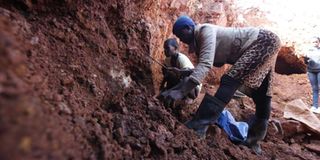'If a woman visits a mining pit, miners get nothing'

Women mine gold at Macalder Mines in Nyatike Constituency in Migori County in 2019.
What you need to know:
- Women in Africa’s artisanal mining sector are viewed as inferior and a bad omen.
- Socio-cultural stereotypes including perception of women as fragile, inferior and carrier of misfortunes have continued to deter them from benefitting from mineral extraction activities.
- Women who constitute about 30 per cent of the global 42.6 million artisanal mining workforce, play undeniably crucial roles in the sector.
Women in Africa’s artisanal mining sector are viewed as inferior and a bad omen. These are stereotypes that industry players are striving to end to pave way for women to thrive in the lucrative sector.
“There is a belief that if a woman visits a mining pit, then the miners will not get anything,” explained Mr Gerard Nayuburundi, Coordinator of Natural Resources Unit in the International Conference on the Great Lakes Region (OCGLR) during a January 20, Gender Equality in Artisanal Mining: Beyond Good Intentions webinar.
The meet was convened by Impact, an organisation that supports natural resource management.
Socio-cultural stereotypes including perception of women as fragile, inferior and carrier of misfortunes, he said, have continued to deter them from benefitting from mineral extraction activities.
“Socio-cultural (stereotypes) are a serious barrier to gender mainstreaming in the artisanal mining sector,” he said.
Impact program leader, Ms Lynn Gitu said women are often left behind during the process of formalising the artisanal mining activities.
She said women are excluded in the process of registering groups partaking in the mining, as the activity is done far away from the mining sites. Yet, they lack money to meet their logistical expenses, she said.
“There is also a requirement during registration for access and ownership of land to get mining rights. We know often women lack legal ownership of land and therefore, cannot make decisions where land is concerned,” she said.
She noted that women are integral part of the value chain and not just there to help men.
“They have the same rights to access resources and have better living conditions within the lucrative artisanal mining sector,” she said
Association of Women in Mining in Africa (Awima) President, Ms Georgette Sakyi-Ado, said women who constitute about 30 per cent of the global 42.6 million artisanal mining workforce, play undeniably crucial roles in the sector including panning, processing and trading goods and services
They, however, continue to be confined to “low-paying jobs and are absent from decision making,” she said.
“We disproportionately face discrimination and gendered violence, and often lack access to financing and resources,” she said.
“Artisanal mining sector cannot be sustainable without women and men who are empowered to determine their own futures,” she added.
She called for application of gender sensitive approaches across the entire sector’s value chain to safeguard the rights of women while ensuring their equally gain from mineral extraction.
“It’s really sad to hear that at this time and age there are people who believe that having women in certain jobs is a bad omen. Why would we be comfortable having women in our farms yet at the same time tell them they cannot dig for minerals? It doesn't make sense. More gender empowerment needs to be done in mining sites that discriminate against women,” said Sammy Muraya, project manager, Journalists for Human Rights





